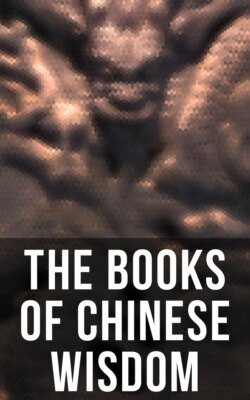Читать книгу The Books of Chinese Wisdom - Mencius - Страница 80
На сайте Литреса книга снята с продажи.
ОглавлениеHexagram LXIV.64 Wei Ȝî
Table of Contents
Wei Ȝî intimates progress and success (in the circumstances which it implies). (We see) a young fox that has nearly crossed (the stream), when its tail gets immersed. There will be no advantage in any way.
1. The first line, divided, shows its subject (like a fox) whose tail gets immersed. There will be occasion for regret.
2. The second line, undivided, shows its subject dragging back his (carriage-) wheel. With firmness and correctness there will be good fortune.
3. The third line, divided, shows its subject, with (the state of things) not yet remedied, advancing on; which will lead to evil. But there will be advantage in (trying to) cross the great stream.
4. The fourth line, undivided, shows its subject by firm correctness obtaining good fortune, so that all occasion for repentance disappears. Let him stir himself up, as if he were invading the Demon region, where for three years rewards will come to him (and his troops) from the great kingdom.
5. The fifth line, divided, shows its subject by firm correctness obtaining good fortune, and having no occasion for repentance. (We see in him) the brightness of a superior man, and the possession of sincerity. There will be good fortune.
6. The topmost line, undivided, shows its subject full of confidence and therefore feasting (quietly). There will be no error. (If he) cherish this confidence, till he (is like the fox who) gets his head immersed, it will fail of what is right.
Footnotes
64. p. 208 Wei Ȝî is the reverse of Kî Ȝî. The name tells us that the successful accomplishment of whatever the writer had in his mind had not yet been realised. The vessel of the state has not been brought across the great and dangerous stream. Some have wished that the Yî might have concluded with Kî Ȝî, and the last hexagram have left us with the picture of human affairs all brought to good order. But this would not have been in harmony with the p. 209 idea of the Yî, as the book of change. Again and again it has been pointed out that we find in it no idea of a perfect and abiding state. just as the seasons of the year change and pursue an ever-recurring round, so is it with the phases of society. The reign of order has been, and has terminated; and this hexagram calls us to see the struggle for its realisation recommenced. It treats of how those engaged in that struggle should conduct themselves with a view to secure the happy consummation.
How the figure sets forth the state of things by its constituent trigrams will appear in Appendix II. A similar indication is supposed to be given by the lines, not one of which is in the correct place; the strong lines being all in even places, and t he weak lines in odd. At the same time each of them has a proper correlate; and so the figure gives an intimation of some successful progress. See also Appendix I.
The symbolism of the young fox suggests a want of caution on the part of those, in the time and condition denoted by the hexagram, who try to remedy prevailing disorders. Their attempt is not successful, and they get themselves into trouble and danger. Whatever can be done must be undertaken in another way.
I suppose a fox to be intended by the symbolism of line 1, bringing that animal on from the Thwan. Some of the commentators understand it of any animal. The line is weak, at the bottom of the trigram of peril, and responds to the strong 4, which is not in its correct place. Its subject attempts to be doing, but finds cause to regret his course.
The subject of line 2, strong, and in the centre, is able to repress himself, and keep back his carriage from advancing and there is good fortune.
The Khang-hsî editors say that it is very difficult to understand what is said under line 3; and many critics suppose that a negative has dropt out, and that we should really read that 'it will not be advantageous to try and cross the great stream.'
Line 4, though strong, is in an even place; and this might vitiate the endeavours of its subject to bring about a better state of things. But he is firm and correct. He is in the fourth place moreover, and immediately above there is his ruler, represented by a weak line, humble therefore, and prepared to welcome his endeavours. Let him exert himself vigorously and long, as Kâo Ȝung did in his p. 210 famous expedition (see last hexagram, line 3), and he will make progress and have success. Expeditions beyond the frontiers in those days were not very remote. Intercourse was kept up between the army and the court. Rewards, distinctions, and whatever was necessary to encourage the army, were often sent to it.
Line 5 is weak, in an odd place. But its subject is the ruler, humble and supported by the subject of the strong 2; and hence the auspice is very good.
The subject of line 6, when the work of the hexagram has been done, appears disposed to remain quiet in the confidence of his own power, but enjoying himself; and thereby he will do right. If, on the contrary, he will go on to exert his powers, and play with the peril of the situation, the issue will be bad.
